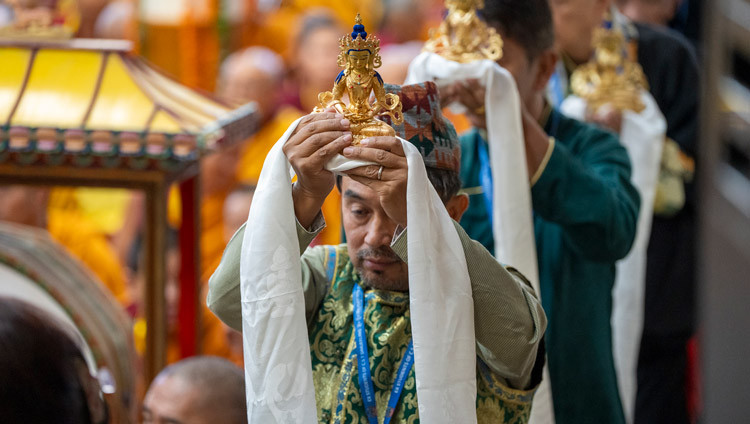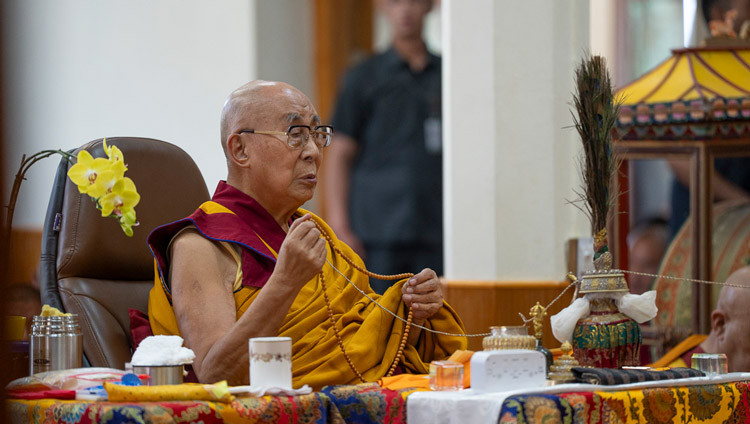Discussion with Groups from Harvard – Second Day
Thekchen Chöling, Dharamsala, HP, India – His Holiness the Dalai Lama opened the second day’s meeting with guests from Harvard by reciting the following verse, which is an aspiration for a long life and for the flourishing of the Dharma:
May you remain for a hundred years, see a hundred Buddhas,
Live long, be free from sickness, feel joy and well-being,
And reach the culmination of the sublime path of (bodhichitta).
In all these ways may everything be auspicious for you here and now.
Arthur Brooks wished His Holiness good morning and told him that today the theme for discussion would be spirituality and faith.
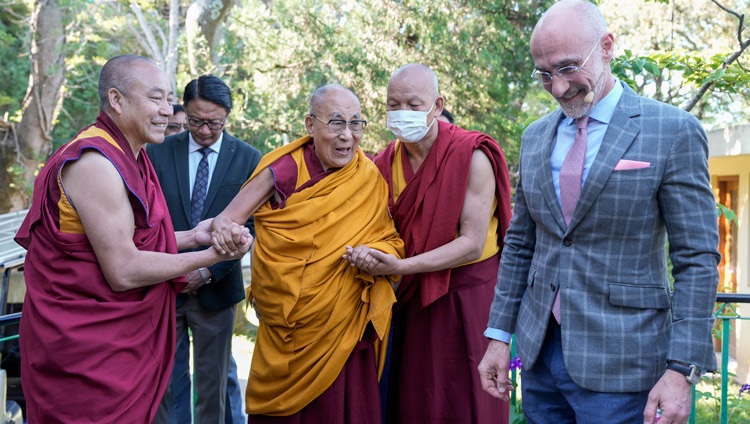
Professor Arthur Brooks leading the way as His Holiness the Dalai Lama reaches the meeting hall at his residence for the second day of discussion with groups from Harvard University in Dharamsala, HP, India on April 9, 2024. Photo by Tenzin Choejor
“Yesterday you told us how important it is to remember our mother’s love and how interdependent we are with other people. It has been suggested that the happiest people focus primarily on work, family, friendship and faith. However, we met a Tibetan hermit who lives alone up in the forest who told us he was there because he wanted to be free from distractions as he focused on love. What is clear is that faith brings us peace.
“Several decades ago, Your Holiness you remarked that seeing a photograph of the earth from space put you in mind of how small we are. It seems you feel that to be small is liberating. How are we to be small?”
His Holiness replied, “We already spoke about this yesterday. We need to see that love is our fundamental reality. Our mother introduced us to it from the moment we were born. It’s part of our basic nature to love. Love pre-empts any acquaintance with religion. A child who has no experience of a mother’s love and care will not survive. This is true not only of human beings, but other mammals as well.”
Brooks suggested that fewer and fewer people have faith or practise religion and he wondered why?
“When we’re born and we bask in our mother’s care and affection, we have no access to religion. The power of our initial experience derives from our mother’s love and her physical embrace. I happen to have been fortunate to have been so dearly loved by my own mother. However, there are cases where children for all sorts of reasons don’t have such an experience and it affects their subsequent development.
“It can be argued that religion sometimes has the effect of distancing us from the basic reality of love, but by and large religious practice can help us enhance the impact of our mother’s love. We can learn to extend our sense of love beyond our immediate family to include a wider humanity and the world of other sentient beings. The key factor is love and our first experience of it is in our mother’s arms as we drink her milk.”
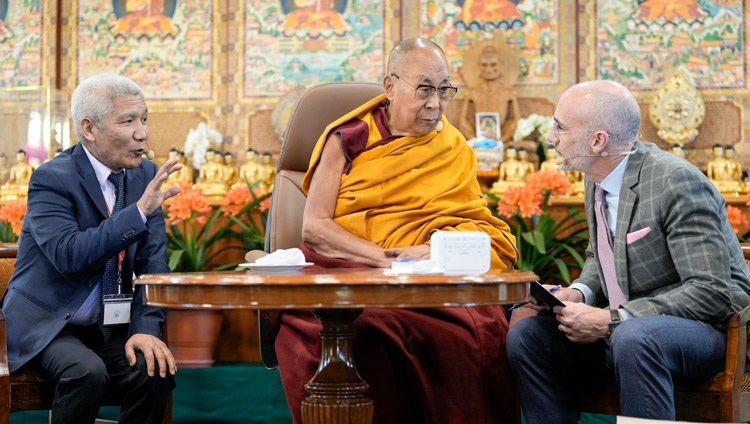
Thupten Jinpa, His Holiness the Dalai Lama’s interpreter, translating during an interaction with Professor Arthur Brooks on the second day of discussion with groups from Harvard University in the meeting room at His Holiness’s residence in Dharamsala, HP, India on April 9, 2024. Photo by Tenzin Choejor
Next Brooks wanted to know if the world would be a happier place if more people practised religion. His Holiness told him that he relied less on religion and more on an approach that was secular and based on universal ethics. However, he acknowledged that we can employ religious practice to strengthen and enhance what we’ve learned from our mother.
“I’m a Buddhist,” His Holiness declared, “I practice the Buddha Dharma and within that two powerful practices stand out. Generating an altruistic mind, thinking of others’ concerns, and analysing my perception of reality. This means moving beyond mere appearances to recognise that all things are dependently arisen.
“When I wake in the morning I reflect on who we are as human beings and I think of our shared experience of starting our lives in the reality of our mother’s love—an experience that contributes to my sense of the oneness of humanity. This is powerfully sustained by the Buddhist practice of recognizing all beings as having been our kind mothers.
“Buddhism is a non-theistic tradition that emphasizes reality and the connection between self and others. Theistic traditions that see all beings as created by God achieve the same aim. Our feelings of love for others are strengthened and enhanced.”
Brooks asked if science and faith were compatible. “Science is a reflection of the human brain,” His Holiness responded. “Human beings may not have the largest brains, but they have an ability to differentiate and analyze. If we see science as a mode of enquiry, it’s not in conflict with faith.
“If we engage in objective enquiry, taking an unbiased approach to whatever we’re examining, science and faith can come to a common understanding. But if we define religion in terms of dogmatic belief it will conflict with science which is about asking challenging questions. We can understand the value of compassion from a scientific point of view for example because it is part of reality.”
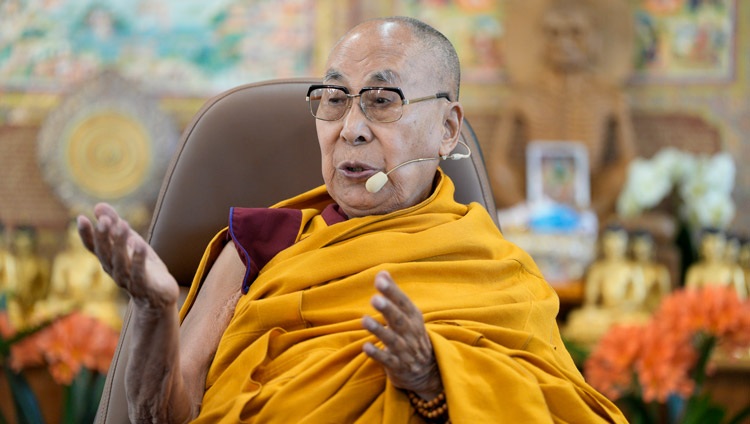
His Holiness the Dalai Lama speaking on the second day of discussion with groups from Harvard University at the meeting room at his residence in Dharamsala, HP, India on April 9, 2024. Photo by Tenzin Choejor
Asked what question science might ask that would make life better, His Holiness was clear that one of the most important issues is how to promote peace in the world. He conceded that simply seeing others in terms of ‘us’ and ‘them’ is natural. But if we allow this to create hard divisions between us it leads to confict and other problems.
Lisa Miller, who examines the psychology of religion at Columbia University wanted to know if love is a constituent force in the universe. His Holiness answered that the power of love is not a function of religion and yet religions generally applaud its importance.
“The fundamental reality of love in not to do with religion, it’s an inborn quality with which human beings have a special relation. Some religious practices can help us nurture and enhance our intuitive feelings of love. If we leave our experience of love in its natural state, our kindness towards others will depend on how they respond to us. But we can train to strengthen and extend it to those with whom we have no direct connection. For a Buddhist, the line ‘May all sentient beings have happiness’ is very powerful.
“Recognizing that the creator formed all beings is also a powerful basis for recognizing the oneness of humanity.
“A practical approach is to remember how each of us was nurtured by our mother’s care and affection. We can learn to extend that reality to others. From a Buddhist point of view, recognizing all sentient beings as having been our mothers makes it virtually impossible to harm them. We wish that they all be free from suffering.
“However, if we allow ourselves to become alienated from this reality, to forget the power of our mother’s love, other attitudes like competitiveness fill the gap. We cling to the idea ‘I am …, my family, my people, my country’, which can be problematic.
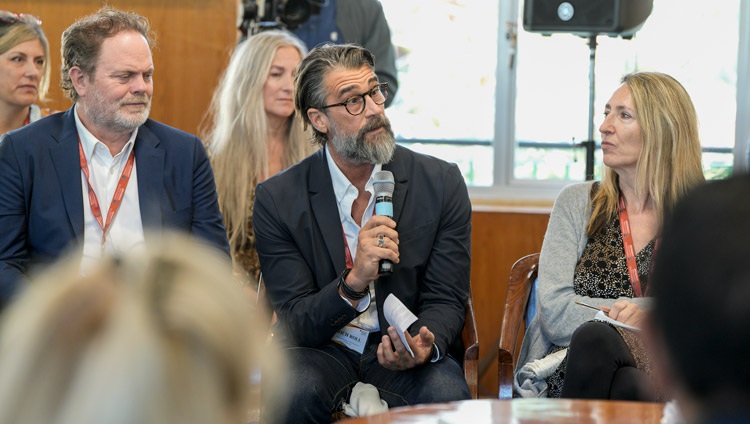
One of the participants in the discussion with groups from Harvard asking His Holiness the Dalai Lama a question on the second day of their meeting at the meeting room at His Holiness’s residence in Dharamsala, HP, India on April 9, 2024. Photo by Tenzin Choejor
“Recognizing all beings as having been our mother is part of a mind-training exercise known as the Seven-part cause and effect. There are six causes and one result. The first is recognizing all beings as having been our mother; the second is remembering her kindness—gratitude; third is the wish to repay that kindness; fourth is to develop empathy, love for all beings; fifth is to generate great compassion, the wish to free all beings from suffering. Sixth is the intention to put this into action—the special resolve. And the final result is to generate the awakening mind, the wish to attain enlightenment for the sake of all beings.
“This is a mind-training method from the Tibetan tradition that is based on a belief in rebirth. Another approach relies on a pledge to switch concern for yourself with concern for others. There’s a well-known verse that puts this in context.
Since self-centredness is the doorway to all torment,
While caring for my mothers is the foundation for all that is good,
Inspire me to make the core of my practice
The yoga of exchanging myself for others.
“We are all the same in being human in our wish to be happy and free from suffering. Turning our concern to others rather than ourselves has a liberating effect. It creates space in our hearts. We could also cultivate concern for others in terms of our all having been formed by the creator. The verse I’ve just quoted could be a succinct summary of what we’ve been talking about.”
Arthur Brooks noted that he and his companions had spent time with His Holiness over two days and would be leaving tomorrow. He asked what His Holiness would like them to do to make the world a better place.
“Find a way to educate other people, to bring home to them that focusing only on yourself is to have a very narrow outlook, whereas having a broader concern for others creates a freeing sense of space in the heart. Even from a historical perspective, most problems in the world are rooted in selfishness. Concern for others can compensate for this.
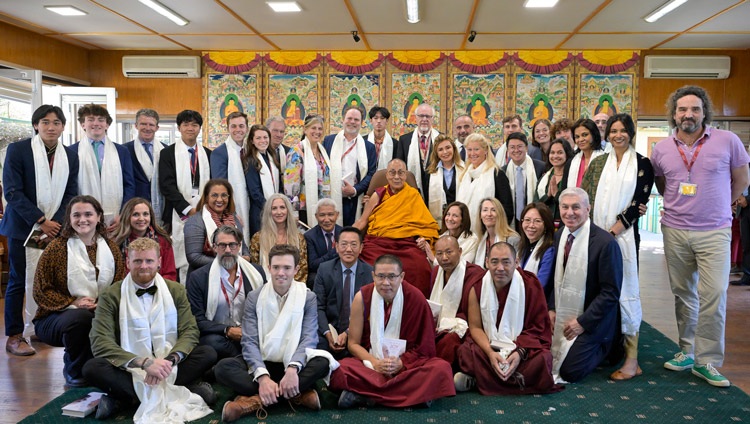
Participants in the discussion with groups from Harvard University posing for a photo with His Holiness the Dalai Lama at the conclusion of the two day meeting at the meeting room at his residence in Dharamsala, HP, India on April 9, 2024. Photo by Ven Zamling Norbu
“When we are too self-absorbed, we become alienated from others. Placing greater emphasis on others’ concerns, considering them the same as us—that’s the way to go. The 8th century Indian Buddhist master Shantideva put it like this:
For those who fail to exchange their own happiness for the suffering of others, Buddhahood is certainly impossible—how could there even be happiness in cyclic existence? 8/131
“I’m very happy to have had this opportunity to meet you all. The real purpose of our gathering here has been to learn how to develop a warm heart. This isn’t something complicated. The key is to be a happy person contributing to building a happy world. Disregarding our tendency to see people in terms of ‘us’ and ‘them’ we should recognize that actually they are just like us.
“All eight billion of us have to live together helping each other as best we can. So seek to be happy here and now and think of your fellow human beings as if they were your brothers and sisters.”



